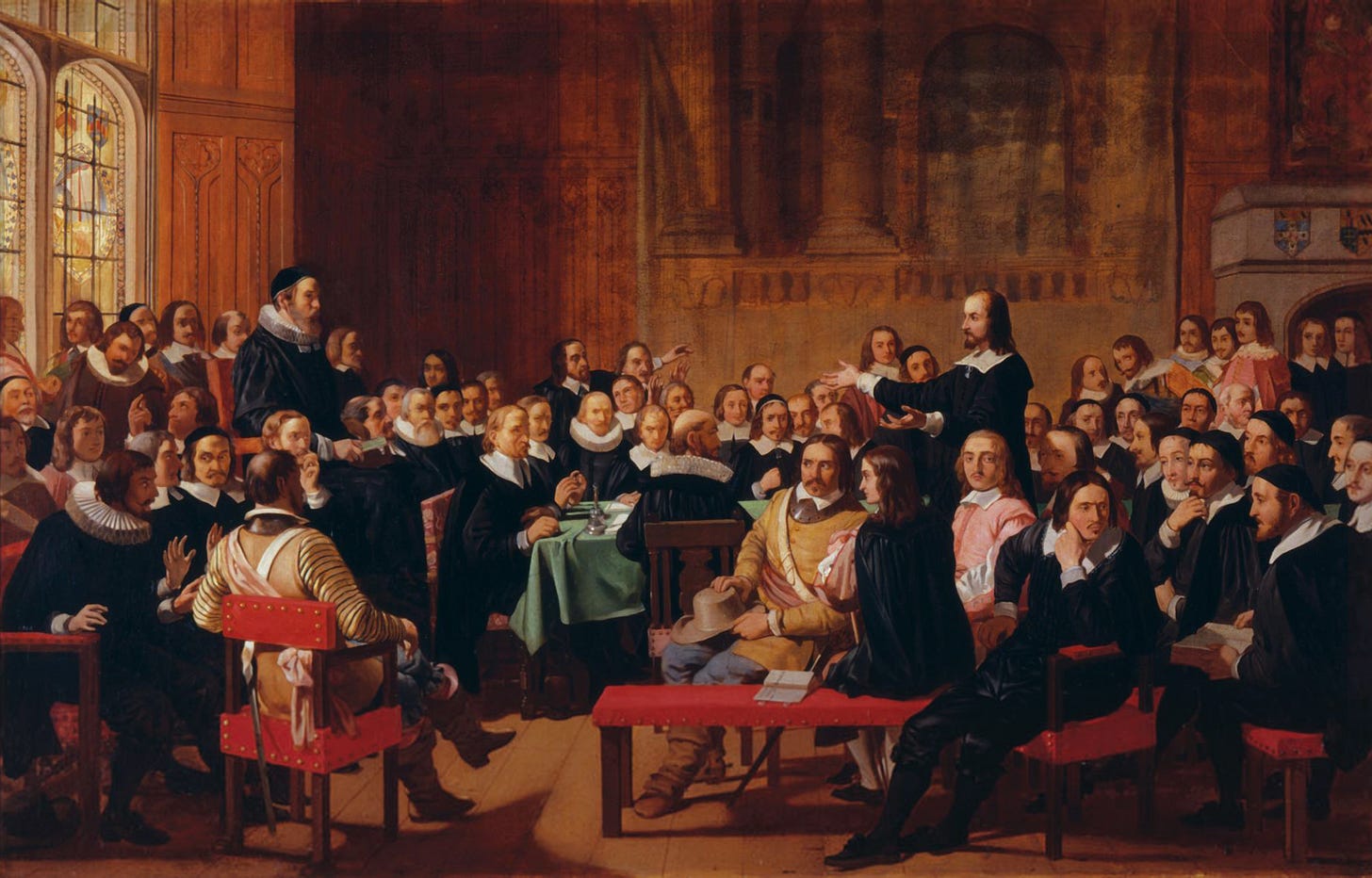
I got ordained back in 2023 by the International Presbyterian Church. In a Presbyterian church, one of the requirements for ordination is that you indicate your agreement with the Westminster Standards1 - comprised of the Westminster Confession, Shorter Catechism and Larger Catechism. This is called subscription.
“Agreement” doesn’t just mean that you are vaguely in favour of the system as a whole, though: it means you actually agree with what it says, including the details (!). But, since many people will have quibbles here or there, and we don’t want people bending their consciences into pretzels, the IPC allows people to take exceptions - in other words, to say “I agree with Westminster, except this and that line of it.” Those exceptions are then reviewed by Presbytery before the ordination. If you’ve taken exception to anything outrageous (“I didn’t like the bit where it talked about the Trinity”) then you’re out on your ear. If they ordain you anyway, that’s effectively saying that those exceptions were within the allowed range of opinion on those topics. Happily, none of my exceptions caused a ruckus.
Anyway, since I am in a public role I thought I should make my subscription public. My statement follows:
I, Peter Leach, declare that I hold to and accept the system of doctrine taught in the Westminster Confession of Faith, the Westminster Shorter Catechism & the Westminster Larger Catechism, as agreed by the assembly of divines at Westminster in 1647 as being a faithful summary of the teachings of scripture. Moreover, I declare that I myself hold the things found therein to be true, noting any exceptions below. In my public teaching and preaching I will uphold these teachings and proclaim them to the church and the world.
Exceptions:
WCF XXI.8. “and recreations... the whole time...”. The Sabbath is for rest, and the Westminster understanding of the Sabbath seems to cast this entirely in terms of worship. While our worship should be restful, I don’t think the claim that it is the only allowable form of rest on the Sabbath can be shown by good and necessary consequence from Scripture. (This exception also applies to the relevant clauses in WSC 60 & 61, WLC 117 & 119.)
On the whole I’m much happier with Heidelberg Q103 than I am with the WS on the Sabbath.
WCF XXIV.1. “For any man to have more than one wife… at the same time.” Contracting polygamy is sin under the new covenant; but if this sin has already been committed, I think the marriages entered into are genuine marriages and should not (necessarily) be dissolved (e.g. in the case of a converted Muslim polygamist). This only applies to polygyny; polyandrous marriages are impossible. Similarly in WLC 139, I think contracting polygamous marriages is sin, but once that sin is repented of, the continued “having more wives … than one at the same time” is not.
WCF XXIV. “The man may not marry any of his wife’s kindred nearer in blood than he may of his own; nor the woman of her husband’s kindred nearer in blood than of her own.” I don’t think this is a good and necessary inference from the Scriptural prohibitions on marrying his wife’s mother or sister.
WCF XXV.6. I don’t think the Pope is the man 2 Thess 2 is talking about, though he bears many of the same characteristics (some Popes more than others!).
WLC.109. “the making any representation of God, of all or of any of the three persons, either inwardly in our mind, or outwardly in any kind of image or likeness of any creature whatsoever”: I think we have to be very careful with images of Christ (I wouldn’t have them in services of worship, for instance) but I don’t think they are necessarily violations of the second commandment.
“the making of any representation of feigned deities...” - intent is important here. I think drawing a picture of Zeus should be allowed in many contexts, just not ones in which there’s any intention or significant likelihood of worshipping Zeus through the picture.
WLC 144. “speaking the truth, and only the truth, in matters of judgment and justice, and in all other things whatsoever”; I think lies in wartime can be lawful (Exod 1:19, Josh 2:5, 2 Sam 17:20).
Technically, in the IPC you’re allowed to subscribe instead to the Three Forms of Unity (Heidelberg Catechism, Belgic Confession, Canons of Dordt) which are the standard confession of Reformed churches on the European continent. But nobody in the UK wing of the IPC has done this.



